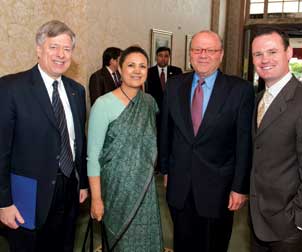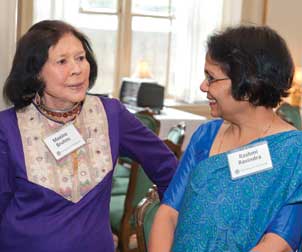India’s Ambassador to U.S. Urges Partnerships Between Indian, U.S. Higher-Education Institutions
 From left, Pitt Chancellor Mark A. Nordenberg, Ambassador of India to the United States Meera Shankar, Carnegie Mellon University President Jared L. Cohon, and Pittsburgh Mayor Luke Ravenstahl.
From left, Pitt Chancellor Mark A. Nordenberg, Ambassador of India to the United States Meera Shankar, Carnegie Mellon University President Jared L. Cohon, and Pittsburgh Mayor Luke Ravenstahl.India is working to partner with higher-education institutions in the United States, hoping to spur the growth of the Indian educational structure, Meera Shankar, Ambassador of India to the United States, told attendees at an April 29 luncheon cohosted by University of Pittsburgh Chancellor Mark A. Nordenberg and Carnegie Mellon University President Jared L. Cohon.
The luncheon was part of Shankar’s two-day visit to Pittsburgh, where she focused on India’s important relationships with the Pittsburgh region.
During her keynote speech, Shankar expressed her country’s desire to achieve universal literacy across India’s 600,000 villages by establishing both a legal framework and funding to provide free education to children between the ages of 6 and 14. India would also like to expand the country’s higher-education system to meet the intense demand for undergraduate and graduate degrees, she said. Included as part of India’s expansion of its educational structure are more robust vocational education and skill-development programs for those who wish to enter the job market without attending a university or college.
Following Shankar’s speech, Chancellor Nordenberg noted that the ambassador had frequently used the words collaborating and partnering—“words that define the Pittsburgh of today,” he said. “Pittsburgh is a city where people are committed to working together.”
The Pittsburgh region has significant economic ties to India through such corporations as Heinz, Mastech, and Alcoa, all of which have operations in India. Additionally, several Indian companies—including Caliber Technologies and Technosoft—have chosen Pittsburgh as a site for their U.S.-based services.
From an academic perspective, the University of Pittsburgh has 17 research and academic agreements with various educational entities in India. Pitt continues to be involved in the MediCiti Center, founded near Hyderabad by Pitt faculty member Sudhakar Pesara “P.S.” Reddy, a professor of medicine in the University of Pittsburgh School of Medicine’s Division of Cardiology. In addition, Pitt employs some 400 faculty and staff members from India.
 E. Maxine Bruhns (left), director of Pitt’s Nationality Rooms Program, talks with Rashmi Ravindra, cochair of the Indian Nationality Room Committee.
E. Maxine Bruhns (left), director of Pitt’s Nationality Rooms Program, talks with Rashmi Ravindra, cochair of the Indian Nationality Room Committee.Earlier in the day, Shankar visited Pitt’s Indian Nationality Room for a roundtable discussion with Pittsburgh business leaders who have significant business interests in India. The Indian Nationality Room celebrates India’s educational heritage and architecture during the 4th through 9th centuries—a period known as India’s Golden Age—when literature, art, architecture, and education reached new peaks of creativity. The room is based on a 4th-to-11th-century monastery courtyard/classroom at India’s ancient Nalanda University in what is now Bihar State. Designed by architect Deepak Wadhwani and dedicated in 2000, the room features replicas of stone columns, brick floors, walls, pilasters, and sculptures still visible at the archaeological site.
Shankar became the Ambassador of India to the United States in April 2009, moving to Washington, D.C., upon assuming that position. Since joining the Indian Foreign Service in 1973, she has held several important assignments. She served as director in the Indian Prime Minister’s Office from 1985 to 1991, and, from 1991 to 1995, she was posted to Washington, D.C., to serve as commerce minister. Thereafter, she headed the Indian Council of Cultural Relations in New Delhi, overseeing India’s cultural diplomacy. Subsequently, in the Ministry of External Affairs, she headed two important divisions, dealing with the South Asian Association of Regional Cooperation and relations with Nepal and Bhutan. After being promoted to Additional Secretary in 2002, she oversaw United Nations and international security issues. Immediately prior to serving in her current position, she was, from 2005 to 2009, Ambassador of India to Germany.
Other Stories From This Issue
On the Freedom Road

Follow a group of Pitt students on the Returning to the Roots of Civil Rights bus tour, a nine-day, 2,300-mile journey crisscrossing five states.
Day 1: The Awakening
Day 2: Deep Impressions
Day 3: Music, Montgomery, and More
Day 4: Looking Back, Looking Forward
Day 5: Learning to Remember
Day 6: The Mountaintop
Day 7: Slavery and Beyond
Day 8: Lessons to Bring Home
Day 9: Final Lessons

